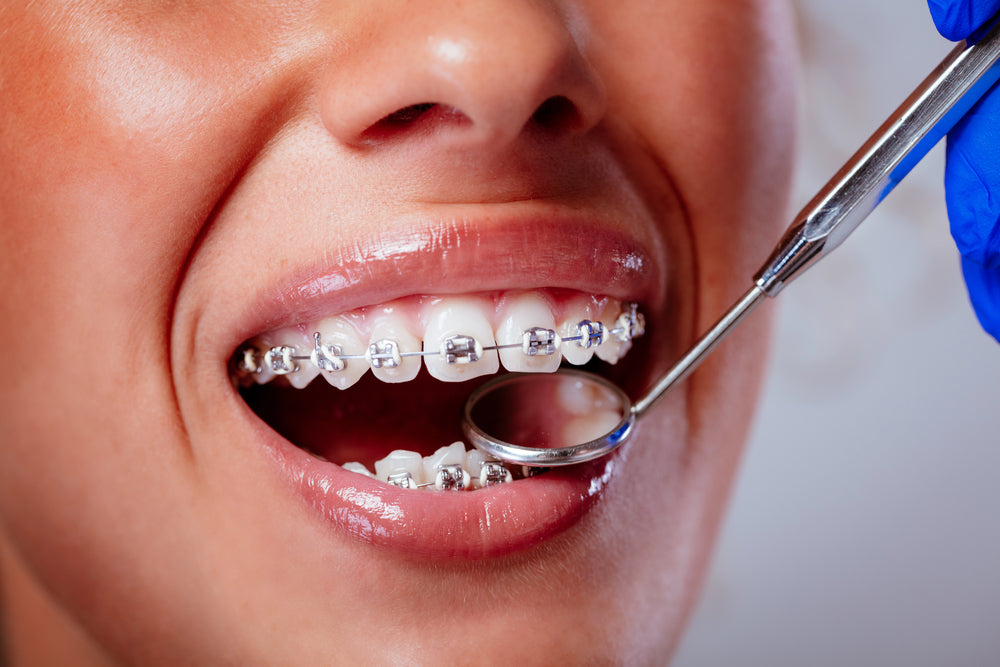
What Happens When You Don't Brush Your Teeth With Braces
|
Time to read 5 min
|
Time to read 5 min
Braces are just one part of the task of achieving that beautiful smile you have always wanted. For stunning results and a healthy smile, it is important to take good care of your braces. It means taking the time to brush your teeth and cleaning out any plaque or food particles that may have built up around the braces.
Continue reading below to find out the negative effects of braces on your teeth and how to clean braces off your teeth.
Poor brushing with braces or not brushing with braces can lead to various issues, from tooth discoloration to tooth decay to gum disease. Brackets on the braces can trap plaque and food against the tooth. Plaque on unbrushed teeth or dirty braces can accumulate around the brackets. If the plaque and bacteria aren’t removed by brushing your braces, they could demineralize the enamel around the bracket. This will discolor the tooth by leaving white spots or creating cavities.
You may not be able to see all this with your braces, but you certainly will be able to see the effects of not brushing with braces once the braces are removed. For example, you could have several white spots on your teeth, known as decalcification. You can also get cavities or gum disease . In some cases, you can form cavities on unbrushed teeth after braces. When that happens, you’ll need an orthodontic specialist to remove one or more brackets, repair the cavity, clean the tooth, reglue the brackets and replace the wires. It can be a timely and costly procedure and one that can be avoided easily by simply brushing your teeth and braces at least twice a day for two minutes at a time. Don’t forget to floss!
In addition to the damage to the teeth, not brushing with braces can damage your gums. Bacteria can build up around the gums and even get between the gums and teeth. Bacteria can damage the tissue holding your teeth in place, which may lead to serious issues like gingivitis or periodontal disease. While gingivitis is reversible, periodontal disease can lead to tooth loss or infection. That infection can spread and cause other health issues. Therefore, good oral hygiene is always vital, especially when wearing braces.
If you are not diligent about your oral hygiene, you may have a mouthful of cavities that require treatment when you get your braces removed. In the worst-case scenario, your cavities could progress to extreme pain while you still have your braces on. In that case, you should have to shop for our great oral health products to keep your teeth in good condition.
Getting braces near you is an excellent option if you are looking to straighten your teeth and get a healthy and radiant smile. However, braces also make your teeth more difficult to clean, and you will need to be extra thorough with your cleaning regimen to avoid further dental issues. In addition, when you wear braces, tooth decay is more likely due to the accumulation of food particles and plaque around the metal brackets.
Here are several tips for braces wearers to follow to maintain optimal oral hygiene.
If you follow these steps and ensure that you avoid certain foods that will stick to or damage your braces, you should maintain optimal oral hygiene throughout your orthodontic treatment. Then, when you finally get your braces off, you will enjoy a brand new, healthy, and confident smile!
When you neglect proper oral hygiene , it leads to the buildup of harmful bacteria in your mouth. If this bacteria is not eliminated promptly, it can lead to gum disease. Having braces enhances this issue because they will have to be removed to remove plaque, cavities, or other dental issues that may arise due to a lack of oral hygiene.
Effective bad breath remedies include:
Gentle and regular scraping of the tongue
Regular oral care practices such as daily brushing and flossing
Professional deep cleanings and plaque removal
The ongoing use of oral probiotics.
One, the probiotics compete with the existing bad bacteria and reduce their presence by “crowding them out”
Two, the probiotics produce BLIS or “bacteriocin-like-inhibitory-substances” which is a technical way of stating that one probiotic strain (bacteria) can produce a substance that inhibits or kills off other bacteria. Three, by working to control gingivitis, gum disease and tooth decay these probiotics reduce the very sources of bacteria-generated odors in the mouth.
Studies have shown a clear reduction in plaque levels and gingivitis symptoms when oral probiotics were administered to patients with moderate to severe gingivitis.


